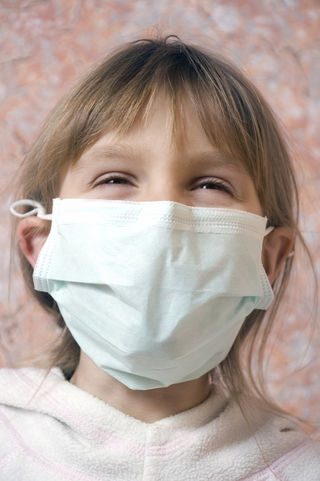Body Language
Paranoid? Not If You Either Go Away or Smile
One bit of body language makes the mask on your face almost disappear.
Posted May 10, 2020

With its genius physical comedy and clash of flamboyant gay and ultra-conservative cultures, The Birdcage ranks high on my list of favorite movies. I watched it again because it’s much funnier than the news; the timely message in it caught me by surprise. In the middle of a guffaw, I realized it’s a great reminder of how paranoia can freeze relationships—but also how a moment of authentic connection with a person can lead to a quick thaw.
At a time when every stranger you see is a viral threat with a mask, paranoia is a common sensation. For some, the easing of stay-at-home policies does nothing more than ramp up the paranoia: “Those other people trying to live a normal life aren’t as careful as I am! They can hurt me!”
The movie puts that sensation front and center in the plot, but the “hurt” that certain characters fear isn’t a virus. It’s either moral depravity or intolerance, depending on which character you are.
The Birdcage is a South Beach, Florida nightclub featuring spectacular drag shows. The owner’s son Val, who was raised by his father and his dad’s longtime drag-queen partner, becomes engaged to Barbara, the daughter of an ultra-conservative Senator who heads the fictional Coalition for Moral Order. The two families plan a get-to-know-you dinner at dad’s South Beach home, with only The Birdcage family fully aware of the complicated nature of the encounter.
The movie does a wonderful job of not painting any of the main characters as a “bad” person. They’re just different. No one is carrying a dreaded, contagious disease; we know that flashy homosexuality and extreme conservatism are not spread through infected droplets in the air.
The surprise that leads to a healthy connection in this story is that everyone stops being afraid of the people on the other side of the spectrum when the truth surfaces. Before the scheme of Val’s family to appear “normal” unravels, all parties had already come to like each other—at least a little. That gives them a foundation to start building trust.
In one scene, the two families plunge into a rousing rendition of “I Could Have Danced All Night.” The dancing pairs are Val’s gay father and Barbara’s prim mother, Val’s “mother” (dad’s partner in drag) and Barbara’s Moral Order father, and the engaged couple. As far as Barbara’s parents are concerned, it’s just a fun evening with a cultural attaché to Greece and his wife, a stay-at-home mom.
When the pretense falls apart, we soon see the value of the laughter and dancing: If you make a genuine connection with another person, it doesn’t matter if one or both have a mask on. Val’s father and “mother”—played with soul and wit by Robin Williams and Nathan Lane, respectively—exuded their natural warmth and playfulness despite their disguise as a heterosexual married couple. Who wouldn’t like them?
Trust can easily come from physical proximity that feels like a comfortable give and take. Open body language is invitational—two people let down their guard with each other and, even though they are as different as the ultra-conservative and the star of a drag queen show, they connect on a heart level.
A genuine smile makes the skin around the eyes crinkle. Even if someone is 6 feet away and partially hidden behind a surgical mask, you can spot a real smile in the eyes. The person has made a choice to connect with you, to not be afraid of you.
If you haven’t seen the movie, my telling you how it ends should not deter you. The brilliant performances, script, and direction are a strong current that will keep you moving toward a hilarious conclusion. And, yes, toward the happy couple’s intercultural church wedding, a union of nightclub and country club.
If you’re in an area where venturing out is now considered safe, with social distancing and masks expected, put your mask on and smile when you see people. They will see it—and you will help thaw the paranoia.


